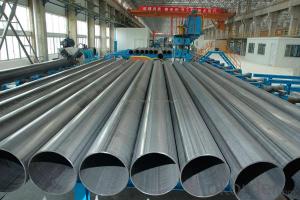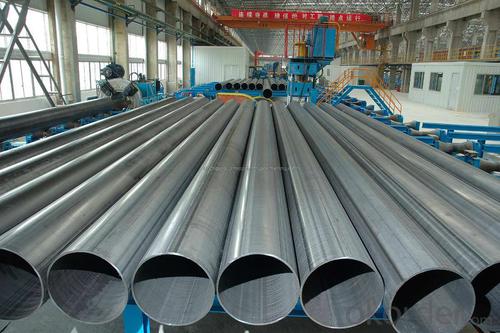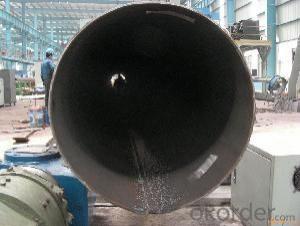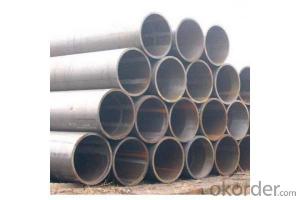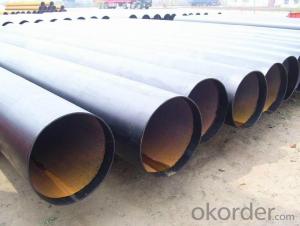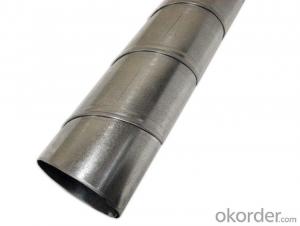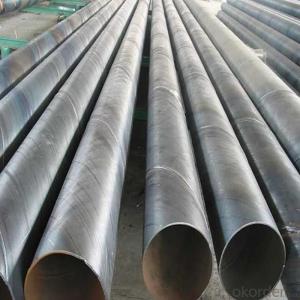LSAW SSAW CARBON STEEL PIPE ASTM API PSL1 16' 18'' 20'' 24'' 26'' 28''
- Loading Port:
- Tianjin
- Payment Terms:
- TT OR LC
- Min Order Qty:
- 1 m.t.
- Supply Capability:
- 3000 m.t./month
OKorder Service Pledge
OKorder Financial Service
You Might Also Like
Packaging & Delivery
Packaging Detail: | Normal exporting packing,in container or bulk vessel or as per clients' request |
Delivery Detail: | 2 months after confimed contract |
Specifications
Large Diameter API 5L X70 PSL2 LSAW Steel Pipe
Grade: X42, X46, X50, X52, X60, B, C
OD: 1.5"-28"
WT: SCH10-SCH160
Large Diameter API 5L X70 PSL2 LSAW Steel Pipe
Specifications:
u Standard: API 5L
u Grade: B, C, X42, X46, X50, X52, X56, X60, X65, X70, X80
u OD: 1.5"-28"
u WT: SCH10-SCH160
u Length: 5-12m
u Ends Finish: plain end, bevel end, grooved end
u Surface Treatment: bare, black varnished, oiled finish, red color, anti-corrosion, 3PE, FBE or epoxy coating
u Technique: hot rolled or cold drawn
u Application: api 5l steel pipe for conveying oil, water, gas
u Invoicing: based on theoretical weight or actual weight
u Payment Terms: L/C at sight, T/T or Western Union
u Trade Terms: FOB, CFR, CIF
u Certification: ABS manufacturing assessment, ABS design assessment, API 5CT, API 5L, DNV manufacturer certificate, ISO9001 quality management system certificate, ISO14001 environment management system certificate, GB/T28001 occupational health and safety management system certificate, A1 class manufacturing license of special equipment certificate, CCS, GL, LR, SGS, TüV, PDE
- Q: Can steel pipes be used for HVAC systems?
- Yes, steel pipes can be used for HVAC systems. Steel pipes are commonly used for HVAC systems due to their strength, durability, and resistance to extreme temperatures. They are suitable for transporting air, water, and refrigerants, making them a reliable choice for HVAC installations.
- Q: What is the shear strength of steel pipes?
- The shear strength of steel pipes can vary depending on various factors such as the grade and thickness of the steel, as well as the manufacturing process and any additional treatments or coatings applied. In general, steel pipes have a high shear strength due to the inherent strength of steel as a material. The shear strength is typically determined through testing and can range from 50,000 to 80,000 pounds per square inch (PSI) for common grades of steel pipes. However, it is important to note that the shear strength can be significantly higher for specialized or higher-grade steel pipes designed for specific applications such as offshore drilling or high-pressure systems. Therefore, it is advisable to consult the manufacturer's specifications or engineering standards for accurate and specific shear strength values for a particular steel pipe.
- Q: What are the common sizes of steel pipes?
- Common sizes of steel pipes can vary depending on the application, but some common sizes include 1/2 inch, 3/4 inch, 1 inch, 1.5 inches, 2 inches, 3 inches, 4 inches, 6 inches, 8 inches, 10 inches, and 12 inches in diameter.
- Q: Can steel pipes be used for signposts or street lighting poles?
- Yes, steel pipes can be used for signposts or street lighting poles. Steel is a strong and durable material that can withstand outdoor conditions and support the weight of signs or lighting fixtures. It is commonly used in construction for such purposes due to its strength and longevity.
- Q: How are steel pipes used in the telecommunications infrastructure?
- Steel pipes are used in the telecommunications infrastructure primarily for underground cable installation. They serve as protective conduits that house and secure the fiber optic cables, providing a reliable and durable solution for long-distance communication.
- Q: The outer circle of a seamless steel pipe 50 head into the outer circle of the 40 to close
- Cold drawn steel tube and cold rolled steel pipe mill is a complete set of equipment which combines cold rolling, cold drawing, cold rolling and cold drawing to produce pipes. It is a unit for deep processing of hot-rolled pipes or welded pipes.
- Q: How do you calculate the pipe flow rate coefficient for steel pipes?
- To calculate the pipe flow rate coefficient for steel pipes, you can use the Darcy-Weisbach equation, which takes into account the pipe diameter, length, roughness factor, and the fluid properties such as viscosity and density. By rearranging the equation and solving for the flow rate coefficient, you can determine the value using empirical correlations or by conducting experimental tests under controlled conditions.
- Q: How do steel pipes compare to other pipe materials like PVC or copper?
- Steel pipes have several advantages over other pipe materials like PVC or copper. Firstly, steel pipes are incredibly durable and can withstand high levels of pressure and extreme temperatures, making them suitable for a wide range of applications. Secondly, steel pipes have excellent resistance to corrosion, which ensures their longevity and reduces the need for frequent maintenance or replacement. Additionally, steel pipes have a higher strength-to-weight ratio compared to PVC or copper, making them more robust and capable of handling heavy-duty tasks. However, steel pipes can be more expensive and require special equipment for installation. Overall, steel pipes are a reliable and versatile option that offers superior durability and performance compared to other pipe materials.
- Q: Are steel pipes resistant to chemicals and corrosion?
- Generally speaking, steel pipes possess a high resistance to chemicals and corrosion. To further enhance this resistance, protective layers such as zinc or epoxy are often applied to steel pipes. These coatings serve as a barrier, preventing direct contact between chemicals and the steel, thus reducing the risk of corrosion. Moreover, steel itself possesses inherent corrosion-resistant properties, making it a suitable material for applications where exposure to chemicals and corrosive elements is common. However, it is worth noting that the level of resistance may vary depending on the specific type of steel, the chosen coating, and the particular chemicals or corrosive substances involved. Therefore, it is advisable to seek advice from experts and carefully consider the specific requirements of the intended application to ensure the appropriate selection of steel and protective measures, thereby maximizing resistance to chemicals and corrosion.
- Q: Can steel pipes be used for underground chemical injection?
- Underground chemical injection can utilize steel pipes. These pipes are widely employed across industries due to their durability, strength, and resistance to corrosion. For underground chemical injection purposes, steel pipes bring various advantages. They can endure high pressure and temperature, making them suitable for the transportation and injection of chemicals into the ground. Furthermore, steel pipes exhibit superb chemical resistance, guaranteeing that they will not interact with the injected chemicals and compromise the system's integrity. Nevertheless, it is crucial to select the appropriate grade of steel pipe that is compatible with the specific chemicals being injected to ensure optimal performance and longevity. Regular maintenance and inspections are also necessary to identify any potential corrosion or damage to the pipes, thus ensuring the safe and efficient operation of the chemical injection system.
Send your message to us
LSAW SSAW CARBON STEEL PIPE ASTM API PSL1 16' 18'' 20'' 24'' 26'' 28''
- Loading Port:
- Tianjin
- Payment Terms:
- TT OR LC
- Min Order Qty:
- 1 m.t.
- Supply Capability:
- 3000 m.t./month
OKorder Service Pledge
OKorder Financial Service
Similar products
Hot products
Hot Searches
Related keywords
